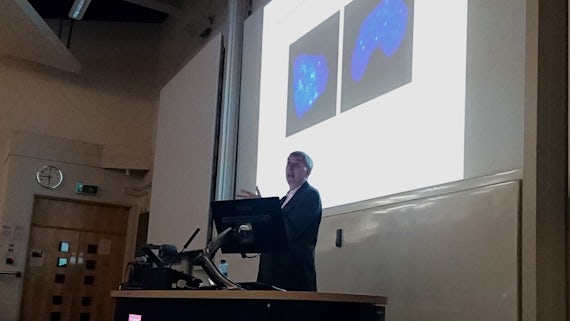Speaker hailed 'First Class' at Raymond and Beverly Sackler Foundation Distinguished Lecture in Neuroscience
10 Mehefin 2016

Professor Jack Price explains exciting developments in neurodiversity at annual Raymond and Beverley Sackler Foundation Distinguished Lecture in neuroscience.
Professor Price of Kings College London and a leading expert in neural stem cells, delivered a thought provoking public lecture on neurodiversity, posing the question ‘Can we model human development in a dish?’
Asking the audience to join in on his ‘thought experiment’, he described a scenario where a young boy has been diagnosed with autism.
He asked “What if you could take the brain cells from the child, as he was developing in his mother, put them in a dish and watch them grow? Then you could discover how the cells were misbehaving.”
Professor Price explains that both ethically and morally, this is impossible. But what we can now do is create the essential elements needed for such an experiment.
By using a recent breakthrough called induced pluripotental stem cells (iPS), cells from a strand of hair for example, can be genetically turned back into a stem cell and from there, can be grown to become any cell in the body.
“Those stem cells can be directed to develop into brain cells in a dish, following exactly the developmental program that led that boy from a fertilised egg into childhood.
“We can do the same experiment with cells taken from his mum and dad, his siblings, or from other autistic or typically-developing children. We can compare his cells with those from a child with ADHD, or schizophrenia, or any other neurodevelopmental disorder.” Professor Price described.
He added, “Stem cell science is allowing us to finally look inside the developing human brain, and ask: What is going on here that makes us all so different?”
Modelling neurodiversity
Professor Price reiterates that we do have to remember that we are at the beginning of such science.
“The advantages (of using iPS) are that this is a cellular model that is incredibly flexible, we can grow it ourselves.”
It’s also an incredibly exciting time as scientists are now able to use cells taken from individual patients. However, Professor Price warns that by using human cells, we are also being offered an entirely different problem.
“Variability is an issue. Now our problem is that everyone is different. That’s good because that’s what we’re interested in, but it then also immediately makes a mess of our results.”
Professor Price summarised his lecture by explaining that a disorder like autism is not going to be reproducible to some small molecular factor.
“These kind of disorders and behaviours as a whole are obviously a system property of the brain, it’s really something that many parts of the brain collaborate together to bring about. The idea that you could reduce it to simple molecular changes and growth in a dish is really quite absurd.”
He asks that we recognise that there are a wide range of developmental features in the brain that are missing in his experiment.

“In time we will be able to add scenarios where we could get cells to wire up to each other and then we could look at the network properties of the cells. Getting to the point of where we can really capture these networks is going to be the challenge going forward.”
Finally, he commented on what is obvious to any scientist, doctor or member of the public; disorders and their features are entirely complex.
“They all feature around set ‘behaviour’ and cells don’t behave. At the moment our studies are completely absent of natural behaviour so we have a long way to go.”
Whilst Professor Price and his team have a new pathway in which to follow, they are in fact focusing on the most complex organ in the human body. But exciting developments have begun.
About Jack Price
Jack Price is a Professor of Developmental Neurobiology and Head of the Cells & Behaviour Unit at the Institute of Psychiatry Psychology & Neuroscience, King's College London. Following his PhD in Neurobiology at University College London, and post-doctoral training at MIT, he ran a research group at the National Institute for Medical Research, Mill Hill.
He was Director of Molecular Neuroscience at SmithKline Beecham Pharmaceuticals until joining King’s College London in 1998. He has published widely on neural stem cells as therapeutic agents, and has served on Working Parties on novel neurotechnologies with the Nuffield Council of Bioethics and the Academy of Medical Sciences.
He led the Department of Trade and Industry Technology Mission to China, Singapore, and South Korea, and served on BIONET, the European Commission project into governance of Biomedicine in Europe and China.
He is on the Scientific Advisory Board of the MRC Centre for Neuropsychiatric Genetics and Genomics at Cardiff University, and is a consultant to ReNeuron Ltd, a UK Biotech Company developing stem cell therapeutics.
Currently, he is part of three European consortia (EU-AIMS, StemBANCC, and MATRICS), funded by the European Commission, using stem cells to study brain disorders.